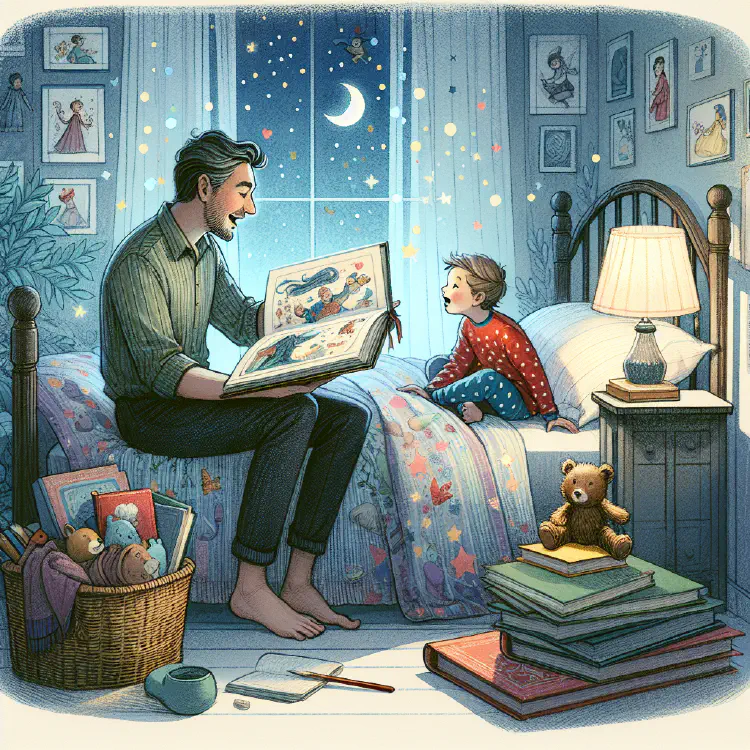Classic Fairy Tales vs. Modern Sleep Stories- What Works Better?
Bedtime stories aid bonding, language development, and relaxation. Classic fairy tales offer cultural significance and moral lessons, while modern sleep stories focus on relaxation and age-appropriate content.
- 4 min read

As parents, we all know the importance of a good bedtime routine for our little ones. One of the most cherished parts of this routine is often the bedtime story. But with so many options available, from classic fairy tales to modern sleep stories, it can be challenging to decide which type of story works best for your child. In this blog post, we’ll explore the differences between classic fairy tales and modern sleep stories, their benefits, and how to choose the right option for your family.
The Magic of Bedtime Stories
Before we dive into the comparison, let’s take a moment to appreciate the power of bedtime stories. Reading to children at night has numerous benefits, including:
- Bonding time: Bedtime stories create a special moment for parents and children to connect.
- Language development: Regular exposure to stories enhances vocabulary and language skills.
- Imagination boost: Stories stimulate creativity and imaginative thinking.
- Relaxation: A soothing story can help children wind down and prepare for sleep.
- Establishing routine: Consistent bedtime stories signal to children that it’s time to sleep.
Now that we’ve established the importance of bedtime stories, let’s explore the two main categories: classic fairy tales and modern sleep stories.
Classic Fairy Tales: Timeless Treasures
Classic fairy tales have been enchanting children for generations. These stories, often passed down through oral tradition before being written down, have stood the test of time. Some popular examples include:
- Cinderella
- Snow White
- The Three Little Pigs
- Little Red Riding Hood
- Hansel and Gretel
Benefits of Classic Fairy Tales
Cultural significance: Fairy tales often reflect cultural values and traditions, helping children connect with their heritage.
Moral lessons: Many classic tales contain moral teachings that can help shape a child’s understanding of right and wrong.
Familiar characters: Iconic characters like princesses, witches, and talking animals capture children’s imaginations.
Rich language: Classic tales often use more complex vocabulary and sentence structures, which can enhance language development.
Adaptability: These stories can be easily adapted or shortened to create five-minute bedtime stories for busy nights.
Potential Drawbacks
Outdated themes: Some classic tales may contain outdated gender roles or cultural stereotypes that require explanation or adaptation.
Scary elements: Certain fairy tales include frightening characters or situations that may be unsuitable for sensitive children.
Complex plots: Longer fairy tales might be difficult for very young children to follow, especially as bedtime stories for toddlers.
Modern Sleep Stories: Designed for Dreamland
In recent years, a new genre of bedtime stories has emerged: sleep stories. These are specifically crafted to help children relax and drift off to sleep. Unlike traditional bedtime stories, sleep stories often focus more on soothing descriptions and calming narratives rather than exciting plots or moral lessons.
Benefits of Modern Sleep Stories
Relaxation-focused: Sleep stories are designed to calm the mind and body, making them ideal for bedtime.
Age-appropriate: Many sleep stories are tailored for specific age groups, such as bedtime stories for preschoolers or toddlers.
Variety of themes: Sleep stories can cover a wide range of topics, from nature and animals to imaginary worlds and adventures.
Shorter duration: Many sleep stories are designed to be short, making them perfect as five-minute bedtime stories.
Incorporation of mindfulness: Some sleep stories include elements of mindfulness or meditation techniques to promote relaxation.
Potential Drawbacks
Less cultural significance: Modern sleep stories may not have the same cultural or traditional value as classic fairy tales.
Fewer moral lessons: The focus on relaxation means that sleep stories might not include the same character-building elements found in classic tales.
Less familiar to parents: Parents might find it challenging to connect with or remember modern sleep stories compared to the classics they grew up with.
Comparing the Two: Which Works Better?
The truth is, there’s no one-size-fits-all answer to whether classic fairy tales or modern sleep stories work better. The effectiveness of each type depends on various factors, including:
- Your child’s age and developmental stage
- Individual preferences and interests
- Bedtime goals (e.g., relaxation, education, or both)
- Time constraints
